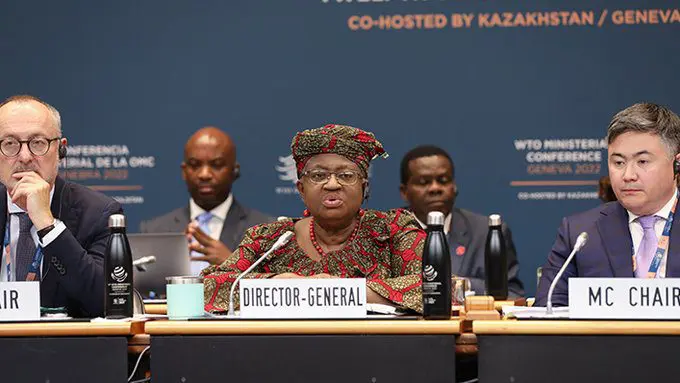WTO Fisheries Funding Mechanism readied to provide support for ending harmful subsidies

Director-General of the World Trade Organisation (WTO), Ngozi Okonjo-Iweala on 14 June introduced the WTO Fisheries Funding Mechanism, which is envisioned to support developing and least-developed countries in implementing a prospective agreement to curb harmful fisheries subsidies.
Interested donors and beneficiaries welcomed plans for the Fund, which the chair of the ongoing negotiations, Ambassador Santiago Wills of Colombia, said will help assure members about the availability of assistance.
We all know that a healthy, productive, sustainable, blue economy is one where our oceans are replenished, where our fish stocks are also healthy, and where fishermen and fisherwomen who depend on such resources continue to earn a decent living,” DG Okonjo-Iweala said at the event at the 12th Ministerial Conference (MC12). “Many members have told us that they need capacity building and technical assistance to better manage their fisheries and implement the disciplines that will be in the Agreement on Fisheries Subsidies. This Fund is something that will be incredibly important to help us help those who need it,” the DG said.
Prospective beneficiary countries and donor partners expressed strong support for the Fund.
Cheryl Natividad-Caballero, Undersecretary for Agri-Industrialization and Fisheries of the Philippines, cited the importance of the Fund: “The Philippines has undertaken initiatives and research on science-based approaches to sustainable fisheries management and will benefit from funding grants that will enhance its capacity and technical knowledge towards ensuring up-to-date resource management mechanisms.”
Virginijus Sinkevičius, European Commissioner for Environment, Oceans and Fisheries, said the EU is committed to the Fund: “The WTO agreement on prohibiting harmful fisheries subsidies will create opportunities but of course, also obligations. It’s important that developing countries are able to get the benefits of this agreement, but also to comply with their new obligations.”
Miyake Shingo, Parliamentary Vice Minister for Foreign Affairs of Japan, said the introduction of the Fund was an important milestone for realizing the successful conclusion of fisheries subsidies negotiations.
Ambassador Usha Dwarka-Canabady of Mauritius said small island developing states (SIDS) have a lot of responsibility over their large maritime domains and therefore need help overcoming challenges to implement the Agreement, including through notifications and information gathering.
Swantje Nilsson, Director-General of Fisheries Affairs at Germany’s Ministry for Food and Agriculture, said Germany stands ready to support the fund with a substantial contribution, subject to the conclusion of necessary rules on fisheries subsidies.
Article 7 of the draft Agreement on Fisheries Subsidies provides for the creation of the funding mechanism to provide targeted technical assistance and capacity building to help developing and least-developed country members implement the Agreement.
“We’ve already received, in the form of pledges for the fund, about $5 million, which is half of the initial amount of $10 million that we’re seeking. A few delegations are favourable towards pledging,” DG Okonjo-Iweala said. “This fund is linked to any prospective new agreement on fisheries subsidies that is being negotiated as we speak. There is considerable advance in the discussions, and we hope we can land this,” she said.
“Developing country members have been aware throughout the negotiations that implementing these new rules on fishery subsidies could be challenging,” Ambassador Wills said. He indicated that there has been reassurance from potential donors that technical assistance would be made available. “This is where the idea to establish a dedicated fund to support implementing the agreement originated: to provide certainty on the availability of assistance as part of the overall package of disciplines. I’m sure it will play an important role in the success of the agreement on fisheries subsidies in achieving its objectives.”
The proposed Fund will be operated by the WTO with partner organizations to tap relevant expertise, such as Food and Agriculture Organization (FAO) of the United Nations, International Fund for Agricultural Development, and the World Bank Group. Around $20 million in contributions will be targeted over the course of the Fund’s operation, with an initial starting amount of around $10 million.
The FAO said its organization is ready to work closely with the WTO and contribute expertise for areas such as the strengthening of institutional capacity, fisheries management, data collection, as well as in the fight against illegal, unreported and unregulated fishing.
Source: 3news.com|Ghana




